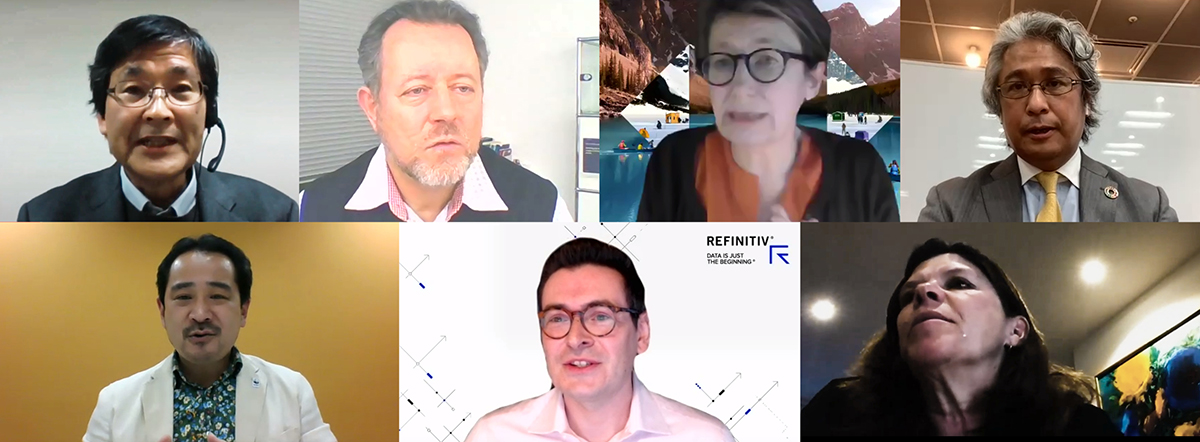The evolution of industry and business has left its mark on nature. As we better understand the damage we are inflicting on the Earth, many firms and governments—with the guidance of United Nations (UN) frameworks—are stepping up to face the issue head on. Protecting the biodiversity of the planet and curbing climate change are now of upmost importance.
In light of the growing conversation surrounding the environment, the British Chamber of Commerce in Japan (BCCJ) held a virtual event on 14 January in which established keynote speakers and panellists discussed the loss of biodiversity. They also explained steps being taken by the British and Japanese governments, as well as businesses in both countries, to tackle the problem.

UK efforts
First to speak was UK Head of Delegation to the Convention on Biological Diversity Dr. Jane Stratford, who is also deputy head of the environment negotiations team at the Department of Environment, Food and Rural Affairs. She began by sharing that 2021 is planned to be the super year for tackling loss of biodiversity.
“The prime minister himself takes a keen interest in nature and biodiversity, and the UK wants to see strong linkages between nature and climate change, [as well as] how we take actions that actually tackle both of those global crises,” she said. “The UK is going to be promoting the adoption of ambitious targets with the 15th Conference of Parties (COP15) of the Convention on Biological Diversity, including strong targets to protect 30% of the land and the oceans by 2030—but also actions that we’ll look at halting extinctions and increasing populations”.
Stratford noted that, this year, there are two big international conventions that will be taking place, both strongly linked to biodiversity and climate change. The UN’s COP15 is scheduled for May and governments attending are set to adopt a new set of global biodiversity targets known as the post-2020 global biodiversity framework. In addition, the UK will host the UN Climate Change Conference (COP26) in Glasgow, Scotland in November.
She then explained other ways in which Britain has been committing to the cause. “The UK is looking to increase financing towards global biodiversity. On 11 January, the prime minister attended the One Planet Summit in France, where he announced that the UK would be spending £3bn of our international climate finance on solutions that protect and restore nature and biodiversity”.
Financial impact
Stratford mentioned in her talk that more than half the world’s total gross domestic product depends on nature. Businesses and financial organisations have a key responsibility to protect biodiversity.
Satoshi Ikeda, chief sustainable finance officer (CSFO) at Japan’s Financial Services Agency (FSA), spoke on the important role played by the financial industry. The FSA created the CSFO position in March 2019 to have a top-level executive dedicated to planning and coordinating the promotion of sustainable finance, in Japan and globally.
“I would say that it’s without exaggeration that a person like myself, being involved with this kind of seminar certainly represents the very critical shift occurring within the financial system. I believe that such tidal change has proceeded in the context of climate change, but it is already reaching the shore of biodiversity as well,” Ikeda said. “I believe natural graded models like climate change and biodiversity will become a part of the financial risk return metrics. In other words, nature-related risk will potentially influence the value of the exposure held by a financial institution and the financial system as a whole”.
He also highlighted the difference between climate change and the loss of biodiversity, and how these differences need to be considered when approaching the crises. “One is the issue of simplicity. In the matter of carbon and climate change, we basically focus on the carbon dioxide or greenhouse gas emissions. So, the metrics we need to look at are very simple. But, in the context of biodiversity, a very complex set of factors are involved in grading biodiversity and nature-related matters”.
Greenhouse gas and carbon emissions are easily quantifiable. While it may be hard to calculate the specific scope, looking back on history and seeing a notable rise in temperature after the industrial revolution is indicative of the situation. Ikeda believes this is why businesses are slow to adapt the measurable targets of their key performance indicators and financial institutions have moved to incorporate biodiversity into their risk management frameworks.
Transformative change
Dr. Tsunao Watanabe, senior programme coordinator for the United Nations University Institute for the Advanced Study of Sustainability explained his organisation’s new project called the International Satoyama Initiative. The initiative aims to realise societies in harmony with nature through the revitalisation and sustainable management of socio-ecological production landscapes and seascapes for biodiversity and human wellbeing.
Watanabe mentioned how past biodiversity conservation efforts have relied on traditional approaches, such as protected areas, with businesses paying for projects as part of their corporate social responsibility programmes. Watanabe believes that biodiversity has been an afterthought, and his organisation’s focus is now on encouraging transformative change.
“Transformative change means that everyone—including businesses—recognises that biodiversity is important and necessary for our wellbeing, and also for our livelihood and business success,” he explained. “Businesses are also stakeholders who rely on biodiversity. So, business practices also need to be in harmony with nature for long-term prosperity. Transformative change is society-wide, because it means business, government, organisations, communities and individuals all use biodiversity sustainability in a way that conserves biodiversity for future generations to enjoy. This is our goal for future biodiversity policies”.
Open discussion
After the keynote speakers shared the government and organisational views and hopes for the future, Iain Ferguson, regional director of Asia–Pacific for insurance market specialists Lloyd’s and president of Lloyd’s Japan, moderated a panel discussion about specific challenges firms face when trying to tackle biodiversity loss.
André Chanavat, director of product management, ESG at Refinitiv, explained that the frameworks for firms to actually report on biodiversity metrics are not quite there yet. In Refinitiv’s database of just under 8,500 publicly listed firms, only 1,700 are reporting on their impact on biodiversity.
Chanavat also reiterated what Ikeda said in his speech, that the difference between climate change and biodiversity can impact the way in which firms are seen to be actively working on these issues. “This is not like reporting on carbon-related metrics, where we have much higher and more numeric outputs to compare against,” he said.
He also noted that 212 of the 1,700 firms that are reporting are Japanese. “We have a total of 460 Japanese firms, so that’s 46% of Japanese firms that have actually made a statement around their impact on biodiversity. That’s the second highest, just behind America”.
Importance of reporting
Marine de Bazelaire, head of sustainability at HSBC Continental Europe, discussed the equator principles (EPs) that most large banks have adopted. The EPs comprise a risk management framework—adopted by financial institutions—for determining, assessing and managing environmental and social risk in projects. “Since July 2020, there [has been] a new commitment on biodiversity and data sharing. The banks have to materialise the fact that we support conservation, including the aim of improving the evidence base for research and decisions related to biodiversity”.
Sadayosi Tobai, chief executive of environmental conservation NPO WWF Japan , also touched on the difficulties stakeholders face when it comes to actually recognising their contribution to the loss of biodiversity.
“Often, biodiversity is being used to produce products, but they may not be the main product,” he said. “One example is palm oil. It’s already a big issue in Europe, but it hasn’t caught up at the desired level in Japan yet. But every single business, every single person, in any part of the world would be using palm oil. Because we use detergent, and often [palm oil is] used in processed food. So, everyone is exposed—almost every business is exposed. But the link is not that clear, therefore they struggle to start reporting”.







